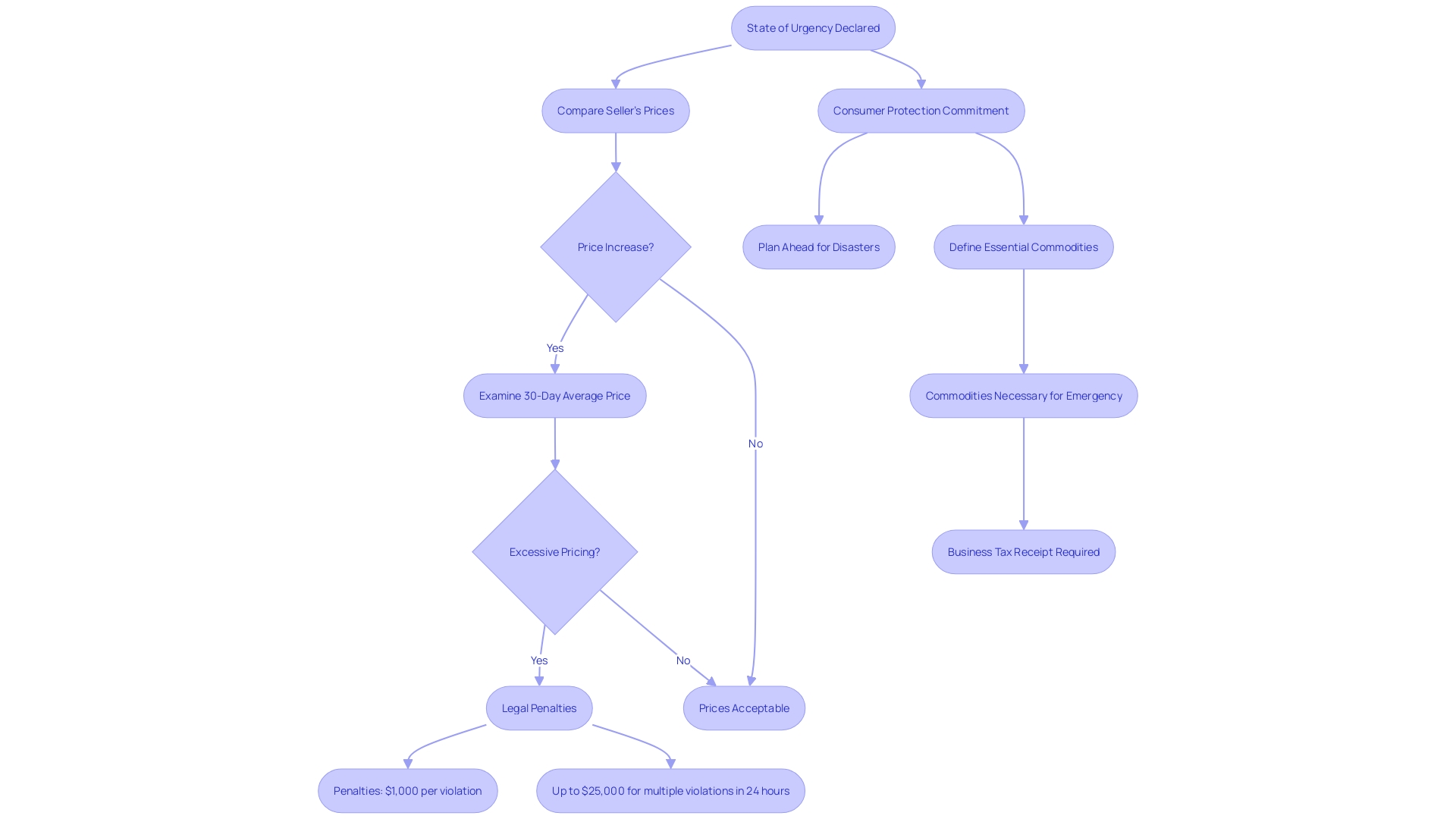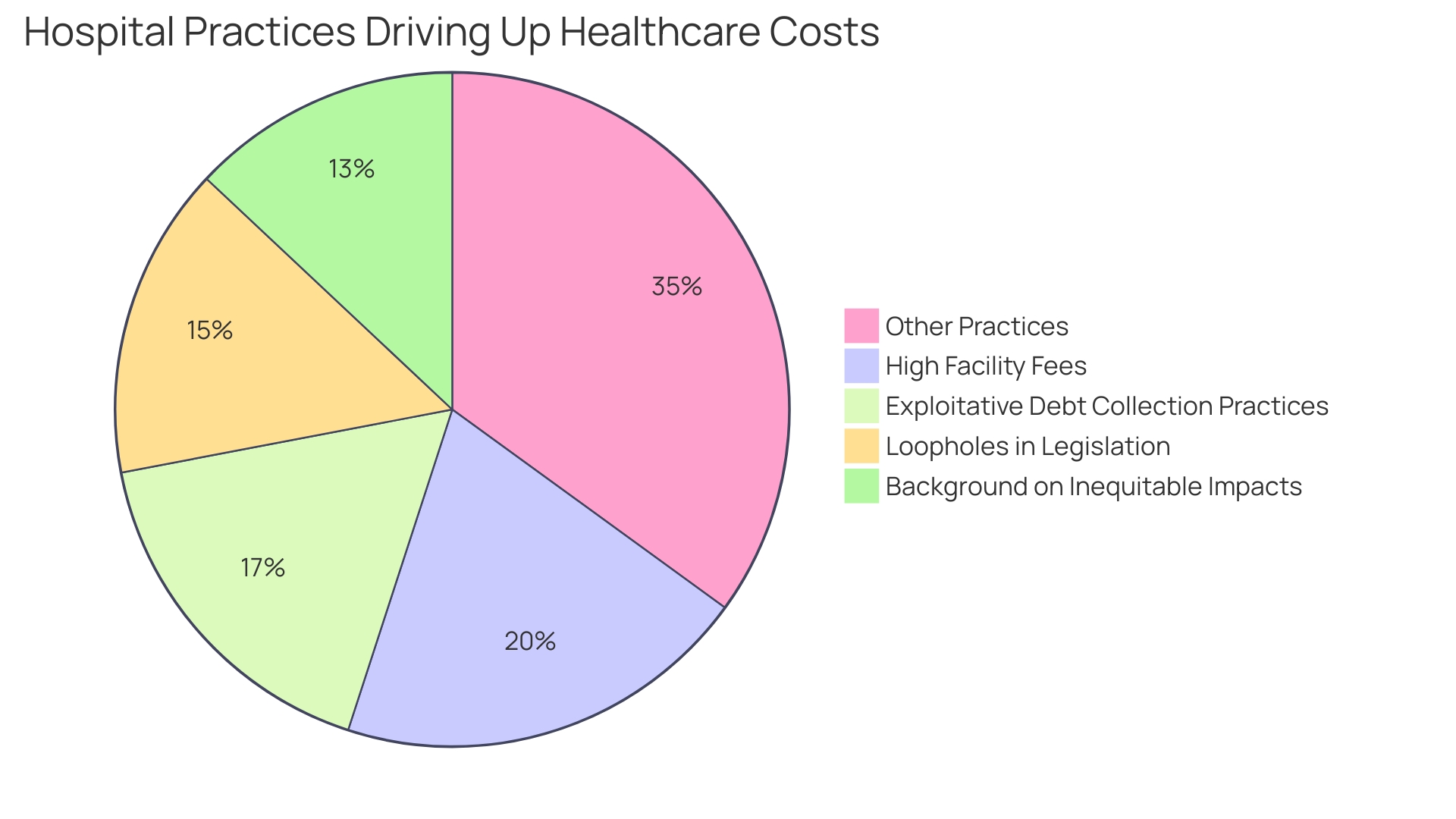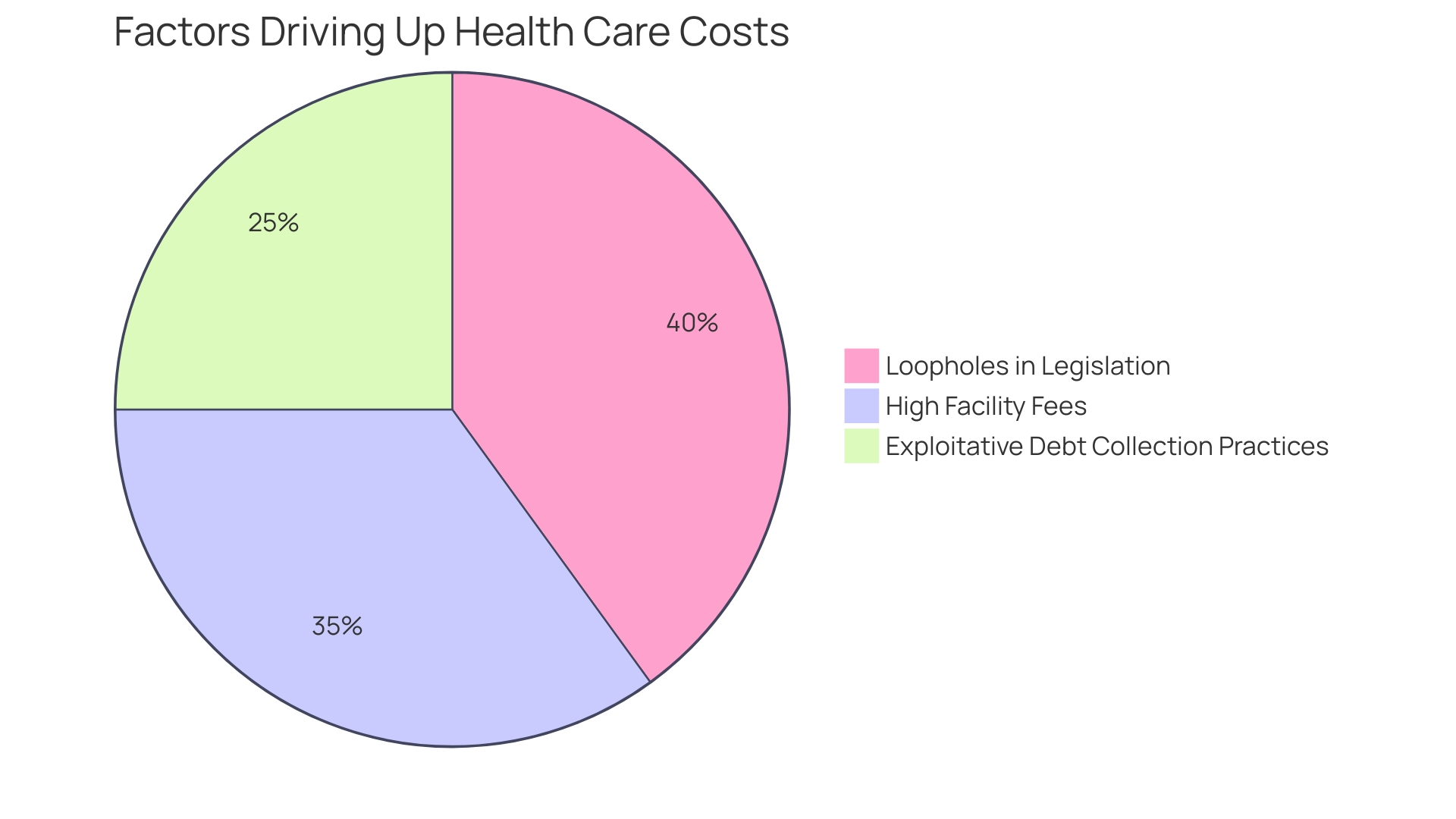Introduction
Price gouging is a concerning practice that takes advantage of consumers during times of crisis, such as a state of emergency. It involves drastically increasing the prices of essential goods to unreasonable and unfair levels. In Florida, laws are in place to protect consumers from price gouging, with clear definitions and significant penalties for violators.
It is crucial for consumers to understand the distinction between price gouging and inflation, as well as how to identify and report instances of price gouging. By being informed and vigilant, individuals can contribute to a fair market environment and protect themselves from exploitation.
What is Price Gouging?
The differentiation between excessive pricing and inflation is crucial, particularly in the context of Florida's gasoline market. Gouging is not merely an increase in prices; it's a spike that occurs under specific conditions, characterized by the American Bar Association as raising the cost of goods to an unreasonable, unfair, or excessively high level during a declared state of emergency. This practice exploits consumers' necessity for essential goods such as gasoline, especially when alternatives are scarce or nonexistent.
On the other hand, inflation is the general and gradual increase in costs over time due to various standard economic factors, including the interplay of supply and demand. The principle that when demand exceeds supply, costs increase, and vice versa, governs typical market behavior. Warren Buffett eloquently distinguishes the two by stating, “Price is what you pay; value is what you get,” underscoring that value is subjective and distinct from the amount paid, which is determined by market forces.
In Florida, the law is explicit about the definition of overcharging. An 'unconscionably excessive cost' is defined as one that demonstrates a gross disparity from the seller's average value in the 60 days before a market disruption. Increases in cost associated with manufacturing, obtaining, or selling goods are not considered excessive pricing. Violations of these statutes are met with significant civil penalties, up to $25,000 for multiple offenses within a 24-hour period.
It's crucial to comprehend that taking advantage of inflated costs is opportunistic and often localized, exploiting a crisis when individuals may be compelled to pay higher prices out of necessity. The U.S. Public Interest Research Group states that while businesses can lawfully increase their costs, they cannot do so excessively to take advantage of a crisis situation.
Distinguishing the distinction between natural fluctuations in cost caused by inflation and the unethical practice of charging excessive prices is crucial for consumers, particularly those who are preparing for urgent situations by stockpiling essential items such as gasoline. This knowledge empowers individuals to identify potential exploitation and seek recourse under the law.
Florida Statute 501.160: Key Points
According to Florida Statute 501.160, it is against the law to levy excessive fees for necessary goods like fuel, particularly in times of state emergencies. Distinguishing between acceptable increases in cost and unlawful exploitation of pricing is critical. Inflation, an economic norm driven by supply and demand, incrementally elevates costs over time. In contrast, gouging is the act of hiking costs to extreme levels amidst a crisis, exploiting consumer urgency for necessities. The statute defines 'essential goods and services' broadly, including food, water, fuel, and medical supplies, among others. It also clearly outlines what constitutes an 'unconscionably excessive price,' which is a price grossly higher than the average in the 60 days preceding a declared abnormal market disruption. The law is enforced with substantial penalties, imposing fines of $1,000 per infringement, and up to $25,000 for multiple infractions within a single day. Proactive preparation, such as maintaining an emergency supply of water and batteries, is advised to mitigate the impact of such emergencies. Meanwhile, the legal framework serves as a deterrent against exploitation, safeguarding individuals from predatory pricing practices.
Essential Commodities Covered Under the Law
Legislation regarding essential commodities, notably gasoline, diesel, and other petroleum products, aims to shield consumers from exploitative practices, especially during times of crisis. These fuels are not merely transactional goods but lifelines that keep the societal engine running, fueling everything from daily commutes to critical business operations. The enforcement of the statute has measurable outcomes, imposing civil penalties for excessive pricing, which can reach up to $25,000 for multiple violations in a single day. This regulatory mechanism is a reaction to the delicate equilibrium of supply and demand dynamics that can be disturbed by unforeseen circumstances, resulting in unwarranted increases in costs. The American Bar Association distinguishes between unfair escalation of prices during emergencies, referred to as gouging, and the gradual increase of prices due to economic forces. The robust evaluation of such measures is critical, as seen in the synthetic control methods used in policy assessments, ensuring that economic interventions are justifiable and effective in real-world scenarios. Furthermore, the emphasis on consumer protection, particularly in the energy sector, reflects a commitment to safeguarding the public against predatory practices while encouraging the adoption of renewable energy sources, as evidenced by the solar industry's initiatives to establish national standards and consumer safeguards.
How to Determine Price Gouging: The 30-Day Rule
Within Florida's regulatory system, distinguishing excessive pricing from legitimate market dynamics is based on a designated retrospective timeframe. If a seller raises prices significantly above the average of the preceding 30 days during a declared state of urgency, it may be considered excessive pricing. This period serves as a reference to safeguard consumers from inflated costs in times of crisis, aligning with the American Bar Association's definition of excessively raising prices of essential goods, especially during emergencies. On the contrary, inflation indicates a gradual increase in costs as a result of the fluctuation of supply and demand. Importantly, legal penalties for inflating prices can be steep, with civil penalties reaching up to $1,000 per violation and a cumulative total of $25,000 for multiple infractions within a single day. This stringent approach reflects the wider commitment to consumer protection, ensuring essential goods and services remain within fair pricing bounds during critical times.

Exceptions to the Price Gouging Law
The complexities and various aspects of fuel pricing can be particularly challenging in situations that may be misinterpreted as excessive charging. It's crucial to differentiate between exploitative pricing practices and legitimate cost-driven increases in cost. Legally, gouging is often defined as increasing the cost of essential goods to an excessive level during a state of emergency. Nevertheless, not all cost hikes are due to malicious intent. For example, a retailer may need to adjust the pricing due to upstream cost escalations—such as a supplier's price increase, heightened transportation expenses, or broader market volatilities, like those seen in the energy sector during natural disasters or geopolitical events.
In recent history, catastrophic wildfires in California have highlighted how unforeseen events can lead to rapid cost increases. Utilities, faced with heightened risks and the need to implement expensive safety measures, may have to modify pricing to manage these new financial burdens, which could be misconstrued as gouging. Yet, these adjustments are often necessary to maintain operations and ensure public safety, despite the potential reputational risks and public scrutiny.
Similar complexities arise in other sectors. For example, during the pandemic, the aviation industry experienced significant disruptions. Van's Aircraft's bankruptcy proceedings revealed the necessity to renegotiate contracts with a 30-percent increase in the cost of aircraft kits, driven by the need to stay afloat rather than exploit customers.
Understanding the factors that legitimately contribute to cost increases is crucial. These factors include production costs, labor, transportation, and distribution expenses, alongside supply-demand dynamics and global trade policies. The complex interaction of these elements was noticeable in the food industry, where costs surged due to the combined effect of COVID-19, the conflict in Ukraine, and climate change consequences.
In addition, the strict implementation of laws against excessive pricing is evident, with civil fines that can go up to $25,000 for multiple infractions in a single day. This emphasizes the significance of distinguishing between justified adjustments in value and illegal exploitation, especially when essential consumer goods or services are involved.
To summarize, although it is important to be watchful of excessive pricing, it is equally crucial to acknowledge and comprehend the valid economic factors behind cost escalations, which are frequently a reaction to the fluctuating expenses within the complex network of our supply chains.
Penalties for Violating Price Gouging Laws
Following unexpected situations, like extreme weather occurrences, Florida's legal structure adopts a strong position against excessive pricing, guaranteeing that impacted residents are not taken advantage of through unjust pricing tactics. According to the state's statute on unfair pricing, individuals or entities found to be inflating the costs of necessary goods can face significant civil penalties. Specifically, each occurrence of excessive pricing may result in a $1,000 penalty, with a maximum limit of $25,000 for multiple violations within a 24-hour period during a declared emergency. Moreover, these regulations empower the Attorney General to take affirmative legal action to secure restitution for individuals who have suffered from such predatory pricing activities.
Recognizing the difference between inflation and excessive pricing is crucial, especially during periods of emergency. While inflation is an economic phenomenon where prices rise due to market forces like supply and demand, price exploitation is a deliberate act of taking advantage of consumers by significantly increasing costs of goods that are essential in critical situations. The American Bar Association defines price inflation as an unreasonable and excessive elevation of costs, particularly during a state of emergency. The U.S. Public Interest Research Group (US-PIRG) echoes this sentiment, indicating that while businesses can lawfully increase costs, they cannot do so excessively to take advantage of a crisis.
The legal boundaries of gouging are well-defined. It usually demands an abnormal market disruption, pertains to essential goods and services, and involves an 'excessive' or 'unconscionable' cost surge, often measured as surpassing a set percentage increase. The consequences of a storm, for instance, is a situation perfect for such illegal actions, with individuals finding themselves with limited options but to pay inflated costs for fundamental requirements like bottled water.
Florida's dedication to addressing excessive pricing is further shown through its public awareness campaigns, like the 'Fraud Summary: Following a Catastrophe' pamphlet, accessible in both English and Spanish, which offers advice to individuals on evading scams in the aftermath of a calamity. These efforts are complemented by clear statutory penalties aimed at deterring would-be violators and protecting the public from opportunistic pricing during vulnerable times.
How to Report Price Gouging in Florida
Reporting excessive pricing is a crucial step to fight against the exploitation of consumers, particularly during periods of calamity when they are most susceptible. In Florida, the escalation of billion-dollar disasters has become a yearly occurrence, increasing from an average of one to four annually over recent years. This increase in natural disasters has not only made excessive pricing more prevalent but also has resulted in a surge in the expense of reinsurance, intensifying the pressure on the state's insurance system. To address these concerns, Florida's statute against excessive pricing imposes strict penalties on individuals who unreasonably raise costs during officially declared emergencies. Civil penalties can reach $1,000 per violation, with the total for multiple violations within a single day capped at $25,000.
To safeguard communities, individuals are encouraged to report such predatory practices to the Florida Attorney General's office. A comprehensive complaint includes evidence of inflated costs, such as photographs or receipts, and detailed information like the business's name, location, and the timing of the incident. This evidence is crucial for the authorities to investigate and enforce the law effectively.
The differentiation between gouging the cost and natural market inflation is significant. The former is an opportunistic practice that exploits consumers' lack of choice, often in the aftermath of disasters. On the other hand, inflation is a broad economic phenomenon in which costs vary according to supply and demand. Understanding this distinction can help individuals discern when an increase in cost is justifiable or when it becomes a matter of legal concern.
By staying watchful and reporting suspected unjust pricing, Floridians can help create a level playing field, even in the aftermath of frequent natural disasters in the state.

Preventing Price Gouging: Tips for Consumers
Understanding the nuances of fluctuations in cost is crucial, especially when discerning between the ordinary ebb and flow of market-driven prices and the unethical practice of overcharging. Imposing excessive or unjustified increases on essential goods is identified as charging exorbitant prices, particularly in critical situations. It's distinguished from inflation, which is the gradual increase in costs due to market dynamics such as supply and demand. For instance, the American Bar Association defines gouging as increasing the costs of commodities to an excessive level amidst a state of emergency, whereas inflation is a natural economic effect over time.
In the face of potential exploitation regarding costs, it's crucial to stay vigilant and well-informed. Observing the average expenses of essential commodities, such as fuel, can establish a foundation for detecting unusual cost increases. Awareness of emergency declarations is also crucial, as they often precede excessive charging instances. Additionally, avoiding panic buying can help prevent succumbing to artificially inflated prices. Proactive measures, supported by a solid understanding of market trends and legal definitions, empower consumers to make judicious decisions and uphold fairness in the marketplace.

Conclusion
In conclusion, price gouging is an unfair practice that takes advantage of consumers during times of crisis. Florida has clear laws in place to protect consumers from price gouging, with strict definitions and substantial penalties for violators. It is crucial for consumers to understand the difference between price gouging and inflation.
Florida's price gouging statute, Florida Statute 501.160, defines price gouging and imposes significant civil penalties for violations. Reporting instances of price gouging is a vital step in combating consumer exploitation. By staying informed, vigilant, and reporting suspected price gouging, consumers can contribute to a fair market environment and protect themselves from exploitation.




